
- Homesteading — the kind that involved living in tents and no machinery — was terribly difficult. I’m sure of it. Of course I already knew this, camping merely drove that point home in a new way. Simple tasks take longer, requiring more planning.
Who wants tea? Well, first you’ve got to make a fire. This might require collecting wood. It will also require making flames first thing in the morning when you are still half asleep. Then you’ve got to wait an eternity for that fire to get hot. Then you’ve got to wait another absurd length of time for the water to heat up. You will probably give up and settle for a lukewarm beverage, if you can wait that long. If there is one thing I hate to go without it is my morning genmaicha. Some campers look forward to that first indulgent post-camping meal. My favorite post-camping experience came the next morning when I got up to make my morning tea. The whole thing was accomplished in minutes with a mere flick of a button. No dangerous half-asleep fire starting required.
- Here’s something you should know before setting out to camp in the wilderness. There are these little insects called Deer Flies. They look an awful lot like regular flies with one exception: regular flies are annoying but basically harmless, while deer flies slice off chunks of your flesh using their special slicing mouth parts. I am convinced that they are collecting human meat for Satan. There is no other explanation. After suffering through five days of their menace, mosquitoes are beginning to look downright civil, polite even. Sure they leave a bump that itches for days and days but by god deer flies have left an indelible scar on my psyche that no ointment will ever heal.
- Note for the future: Do not allow me to camp with small children. Not because camping is hard (except that it is) but because when faced with legions of biting insects, strong winds, and four hours of arm-breaking canoing I am unable to prevent the steady stream of elaborate cursing that will inevitably come pouring from my mouth. Please, think of the children.
- The best way to learn what makes a plant tick is to see it growing in the wild. I consistently glean a lot of knowledge from these experiences. This trip taught me tons about blackberries and blueberries. Both were in season and both were easily found just about anywhere we went. Blackberries were always fully exposed, growing where the sun shone brightly and the soil was poor or non-existent. Sometimes it grew in the sand right at the water’s edge or in open meadows sitting alongside wetlands. Blueberries tended to be underneath the shade of larger coniferous trees or just on the edge of forests. They were always found among the low, sprawling juniper bushes.
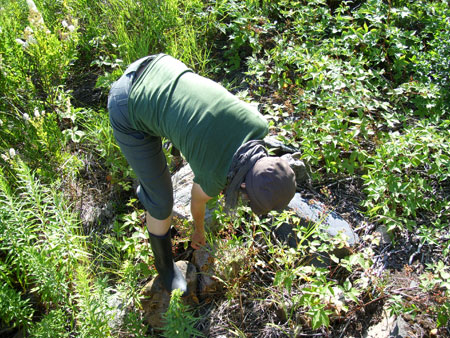
Picking blackberries.
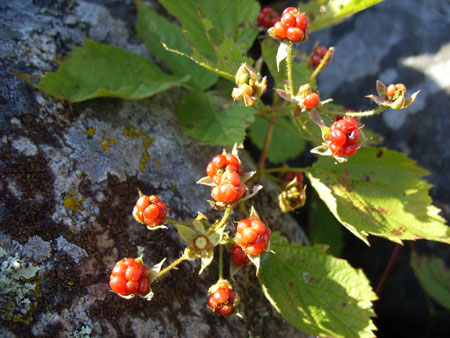
Blackberries growing out of a rock.

Check out the view behind me.
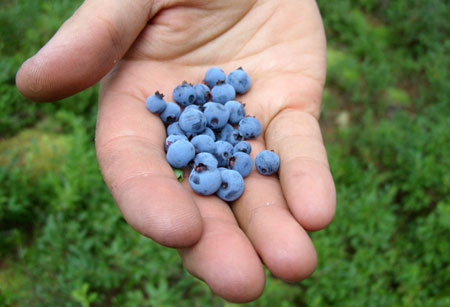
Wild Blueberries. Tasty and FREE! Foraging makes me feel like I’ve scored the most awesome deal in town. Sure I have to do the work but still…. FREE. Picking them by hand has given me a whole new appreciation for the price of a pint of wild blueberries.
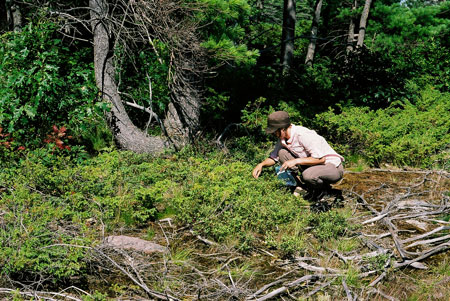
Picking Blueberries. Note the coniferous trees both big and small. The ground was basically granite and pine needles.
- Here’s a tasty camp dessert that I made up on the spot utilizing our foraged berries and provisions we had on hand. Add some sugar and fruit juice to a bowl of wild berries. Break up a few slices of bread into small chunks and add to the mix. Set it aside for 30 minutes or so allowing the bread to soak up the juices. Wrap it all up in foil and set over the fire to cook for about 15 minutes. Enjoy. Go ahead and lick the foil but try to avoid cutting your tongue.
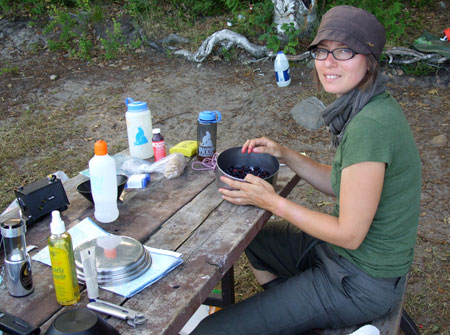
Making foraged wild berry dessert. I look high here but I promise you the only thing I inhaled on this trip was fresh, super oxygenated air. And a lot of campfire smoke. I like to make fires so fire-starter was my self-appointed role.
- Camping in the rain is another kind of tricky. Have to go to the bathroom outdoors in the rain? Try to hold it in. That’s all I have to say about that.
- I have a lot to learn about plants. And mushrooms… forget about it. Better to assume they are all poisonous.
- Camping is a reminder of how easy we have it, a demonstration in the excesses in our modern lives that we can probably do without. I learned that baking soda really is the miracle powder. You can use it to scrub dishes, wash hair, brush teeth, and remedy bee stings. It really doesn’t taste that bad when used as toothpaste.
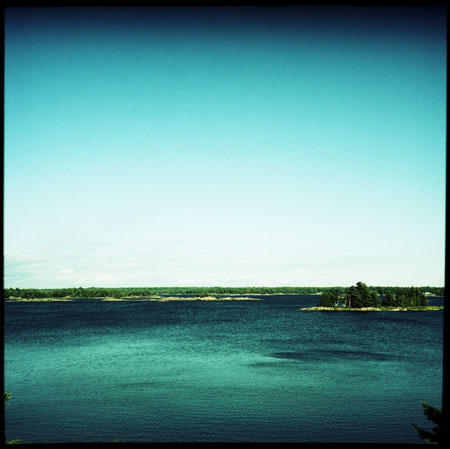
- I can tolerate all manner of dry, bland food when forced. Being surrounded by beautiful landscape makes everything go down easier.
OH i know the feeling! A few years ago I lived for 4 months in a small cabin in the woods with no electricity or running water. One of the first things I learned how to do was bank the coals of a fire overnight so I could have a kettle of hot water in morning. In my case it was more about being able to wash my face properly than the tea but my boyfriend at the time was a confirmed tea drinker and it made us both much more civil to have hot water first thing. Doing this with an open fire takes practice and if it rains heavily you are out of luck. Once we installed the wood stove inside the cabin it became a no-brainer and it made all the difference in the morning.
I still love foraging whenever I’m in the woods and like you I am too unfamiliar with wild mushrooms to take a chance- we should find someone to teach a course in identifying mushrooms!
CallieK: That’s ambitious! I saved my coals but they were not hot. We didn’t have anywhere to store and wanted to be safe. It’s been wet so having a fire was okay but still…
Taking a mushrooming course is on my life to-do list. I’ve been thinking it is time to make this happen.
I recommend a lightweight camping stove next time you go out. They can be bought at MEC for less than $50, they’re tiny (less than 100 grams) and they’ll make your tea faster than you can at home :) Makes cooking so much easier too. Plus your partner will have fun picking one out at MEC. Go for one that uses cannisters rather than liquid gas (liquid gas is a pain).
Hanah: Our friends brought a stove… but I set the table on fire when I tried to use it so….
Enjoyed your post and sense of humor! Love the genmachai tea as well.
Shirley
Your photos are awesome and make me think of the trips my family made to the Georgian Bay. (Don’t know if that’s where you went…) We came from stateside in Western NY, but made the trek a few times in high school. Thanks for bringing up fond memories. Also, thank you for doing this website, and the book and everything. I’ve been visiting for a while and really enjoy it.
ah, just saw the other post where you said where you went, and I see I was right! We used to camp farther north. We too camped on an island, but we had the benefit of a motor boat…
Kristine: Yes it was Georgian Bay! I should have cross-posted the posts to make it clearer.
There are mushroom forays here in NL every fall.
You can learn to identify as you collect. This year the site’s are in Central and Labrador(Forteau and Battle Harbour).Here’s a link to all info:www.nlmushrooms.ca
I was going to ask you how you did with the fire…I’ve seen first hand how very much you love it.
i’ve been hearing more about these deer flies/ horse flies lately. i’ve never seen one but they freak me out! if it could be proven that these were one of the species to benefit from climate change, i’m sure we’d see a lot more action being taken…
the blueberries look delicious!
I made a call to Forbes- my favourite wild mushroom providers and they suggested I look up the Mycological Society of Toronto. Apparently they hold forays in spring and fall. Their website is http://www.myctor.org/
but they don’t have a fall schedule up yet. Anyone else interested in going wild mushroom hunting?
Quant: They are definitely benefiting from the wet summer. My friends said they were not such a problem last year.
CallieK: That’s great. Will have to keep checking for a schedule.
You could start foraging for mushrooms by picking only the most unusual and unmistakeable species. We used a couple of good field guides, one of which highlighted similar looking mushrooms that could be mistaken for each other. In the Rocky Mountains chanterelles and giant puffballs were easy to identify as were some of the pored mushrooms. We also tried to pick and identify one of each type we came across in order to learn more about them. Making spore prints is very useful (and they are very decorative.) Later we joined the mycological society and learned a great deal at their talks, the most important lesson being to avoid LBM’s (little brown mushrooms) completely as they are all too similar and even experts make (dangerous) mistakes.
Botanizer: Thanks for the tips. I think I am too chicken to attempt from a book alone. I have seen puffballs growing and have been able to identify them since I was a kid but am still too freaked to try myself. I ate mushrooms off the lawn when I was a kid and had to be hospitalized so there is a lingering fear from that experience. Although I would also say a lingering fascination was grown from the same experience. I have never been able to look at a wild mushroom without wondering about it.
Hrmmmmm. Me thinks you should have tried car camping first.
Like with many things, going cold-turkey, hard-core, far-from-civilization camping can be pretty overwhelming at first, and can be enough to turn a newbie off.
But when you camp next to your car the food is less bland (since it can be grabbed out of a cooler instead of freezedried, and cooked quickly on a propane camp stove), you can watch movies and listen to music (off a laptop plugged into a cigarette lighter), and there are usually dry washroom facilities close by (or at least, within driving distance).
Which is not to say that truly roughing it isn’t a lot of fun too, but I think it’s much easier to ease into if you’ve done more casual, relaxed car camping a few times first.
Beth: I’m not turned off. I’d do it again. It was hard but it was still really great!
This makes me think of my recent camping trip to Northern BC (Tumbler Ridge, specifically). The flies, oh the flies…
Your description of deer flies is priceless. I have many awful memories of being relentlessly pursued and tortured by deer flies. I never thought they were collecting human meat for satan but I think that is absolutely possible – lol.
Great pics. They make me miss Ontario wilderness from out here in BC. I need more canadian shield in my life.
Gayla,
I am just back from my second camping experience in the â€Âwild†so I can relate to what you say in this post.
I think a portable stove would definetely improve your experience. And I must tell you : camping food can be very enjoyable if you plan it well.
For example, I cooked lentils and rice with Indian spices and raisins one night. The following day we had a lentil casserole with salami and dried tomatoes. In the morning we would have couscous with dried fruit, brown sugar and pumpkin seeds. All of those dishes were made from dried foods cooked in boiling water. Most of what we brought to the campsite were dried foods stored in a zillion Ziplock bags. Next time, I’ll have to find a classifing method for all those Ziplocks!
One book allowed me to discover all this and to finally enjoy camping. It’s La gastronomie en plein air, by Odile Dumais. It is in French but I’m sure an equivalent exists in English.
Good luck with your next attempts. With every experience, camping becomes more enjoyable.
Christine
What a wonderful post! It looks like you were able to camp in an amazing setting.
Also, I would much rather be woken up by, well, anything but the screaming children we were greeted with on our recent trip. So, I totally agree on that count.